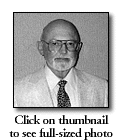John W. Tibbetts
San Francisco State University, Professor, Established the Center for Adult Education, 1961 - 1992
Consultant to Liberia Project, West Africa, 1968 - 72
Santa Fe Springs High School, Department Chair, Language Arts, Whittier, CA, 1958 - 1960
McClain Elementary School, Instructor, Rockland, Maine, 1954 - 1958
Excerpt from an interview with:
JOHN W. TIBBETTS by CUBA Z. MILLER
October 21, 1994 - May 17, 1995
Daly City, California
MILLER:
One of the benchmark projects that prompted a lot of changes in California was
the APL[Adult Performance Level] Study out of Texas. Can you briefly tell us
what that project entailed and what prompted the change in direction or the
different approach to defining literacy that that study took?
TIBBETTS:
Well, Norvill Northcutt was the person who headed the research for the APL
Study, as you know, and the notion was that there are different kinds of
literacy, that people might be literate in books but not literate in daily
lives, or vice versa.And so they received a very large grant from the U. S.
Department of Education to do a study to see how literate people were in
fulfilling their daily life activities.The APL stood for the Adult Performance
Level Study.They administered instruments that asked them such things as: how
to fill out an application form, to see if they could do that; if they were to
purchase something, to see if they could figure out what was the best buy out
of three different products; those kinds of daily activities which required
computation and reading and writing at that level.And the results of the
study, that everybody knows too well by now, was that about 20 percent of the
population was considered to be not literate enough to function in those daily
activities.And that created a lot of shock waves across the country and hit
the headlines over and over again, and still does.Interestingly enough, people
still go back and quote that; most interestingly because a recent study which
was completed pretty much has replicated that that condition still exists.
MILLER:
The National Adult Literacy Survey[NALS] that's just been completed.
TIBBETTS:
Yes, right.Of course, that's in a way interesting too because the literacy
requirements have been increasing every year.The Northcutt study [began] in
1971 or '72, so that's been twenty-five years almost since that happened; and
in the last twenty-five years, people in the workforce and in their daily lives
I think have to be more literate than they used to be even back then.
MILLER:
Okay.You had some direct involvement in that project, didn't you?
TIBBETTS:
Not with the APL Study directly.My first involvement became when the Far West
Lab had a related project headed by Betty Tuck, and Betty asked Dorothy and I
if we would participate with her in that project. And that was sort of a
dissemination[project] to get people talking about a performance level study,
and particularly to talk about what came to be known as competency-based adult
education.That was the direct outgrowth of the APL Study, that we should train
people to be competent in their daily lives.That wasn't being done. We were
teaching them to be competent in reading unrelated materials, doing unrelated
math and so forth. There was no application or transfer to their daily lives.
And that seemed to be a very logical notion to us, and so we became both
interested and excited about the possibilities of carrying that on, so we
joined Betty Tuck.
Our first California venture was held in San Diego, a conference in 1972, I believe, in which we invited leaders of adult education from around the state. We also invited Norvill Northcutt, and he came and presented his findings, and we broke into small groups and discussed the research study and discussed the implications for adult ed., and there was quite a bit of interest. And that was about the time when there was a transition in adult education directorship from Roy Steeves, who had been the State Director [1967-75], to Don[ald] McCune, who became the State Director[1975 - 86]. And I can't give you the years for that, but they're certainly on file somewhere. But Don McCune was very interested in the notion of competency-based education; and without his support, it never would have taken off in California.

